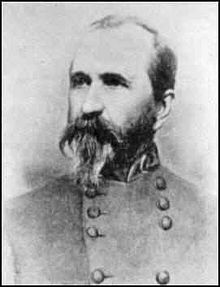John C. Brown (politician, 1827)
John Calvin Brown (born January 6, 1827 in Giles County , Tennessee , † August 17, 1889 in Red Boiling Springs , Tennessee) was an American politician , governor of Tennessee and major general in the Confederate Army .
Youth and advancement
Brown was the younger brother of former Tennessee Governor Neill S. Brown . He studied law at Jackson College in Columbia and graduated at the age of 19. He was admitted to the bar two years later. From 1848 to May 1861 he practiced successfully as a lawyer. In the years leading up to the Civil War, Brown always supported the Union. When Tennessee joined the secession, however, he fought on its side in the war out of loyalty to his state.
In the Civil War
In 1861 Brown joined the 3rd Infantry Regiment of the Provisional Army of Tennessee as a captain and was appointed commander of this regiment on May 16 of the same year, which was incorporated into the Confederate Army. At the Battle of Fort Donelson , February 14-16, 1862, Brown commanded the third brigade of Major General Buckner's division , which was besieged by the Union Tennessee Army . When the fort was captured by Union troops on the 16th, they captured Brown and only released him six months later. After his release, he rejoined the Confederate and was promoted to Brigadier General on August 30, 1862 . He took part in the "Heartland" offensive and was wounded on October 8, 1862 in the Battle of Perryville . He was wounded again in the Battle of Chickamauga on September 19 and 20, 1963. Upon recovery, he participated in the Atlanta Campaign and was promoted to major general on August 4, 1864 .
Political career after the civil war
After the war ended, Brown went back to Pulaski and continued to practice law, joining the Democratic Party and actively participating in politics. In 1870 he was President of the Constituent Assembly. In 1871 he was elected Governor of Tennessee and was the first post-Civil War Democrat to hold this position. He ran again and was confirmed in his office for another two years in 1873. During his tenure, the biggest problem was the high public debt of around 43 million dollars . At the end of his term of office this was only 20 million. Brown also reorganized the school system. However, he also founded the racial schools, a practice that would endure in the southern United States through the mid-20th century.
After the end of his tenure, he made a fruitless attempt to be elected to the US Senate . He subsequently worked as a lawyer. He temporarily moved to Texas , where he became president of a railroad company. Back in Tennessee, he was still President of the Coal and Iron Company , then the largest industrial group in the South.
Brown had been married to Bettie Childress since 1864, who at the time was considered one of the most beautiful and educated women in the South.
See also
literature
- David J. Eicher: The Civil War in Books: An Analytical Bibliography. University of Illinois, 1997, ISBN 0-252-02273-4
- Richard N. Current: Encyclopedia of the Confederacy. 4 volumes, 1993, ISBN 0-13-275991-8
- John H. Eicher and David J. Eicher: Civil War High Commands. Stanford University Press, 2001, ISBN 0-8047-3641-3
- Ezra J. Warner: Generals in Gray: Lives of the Confederate Commanders. Louisiana State University Press, 1959, ISBN 0-8071-0823-5
Web links
- John Brown at the National Governors Association (English)
- The governors of Tennessee (English)
- John C. Brown in the database of Find a Grave (English)
| personal data | |
|---|---|
| SURNAME | Brown, John C. |
| ALTERNATIVE NAMES | Brown, John Calvin (full name) |
| BRIEF DESCRIPTION | American politician, governor of Tennessee, and major general in the Confederate Army |
| DATE OF BIRTH | January 6, 1827 |
| PLACE OF BIRTH | Giles County , Tennessee |
| DATE OF DEATH | 17th August 1889 |
| Place of death | Red Boiling Springs , Tennessee |

